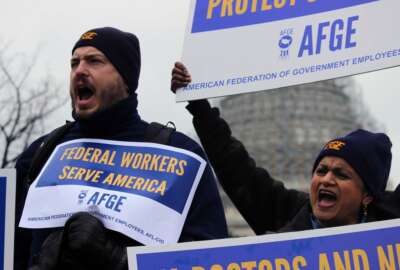
Despite last year’s victories, familiar challenges resurface for AFGE in 2020
The American Federation of Government Employees said it faces a series of familiar challenges again this year, despite the addition of new paid parental leave...
For employee unions, 2020 looks much different than it did this time last year, when much of the federal workforce was still recovering from the shock of the longest government shutdown in U.S. history.
But a year later, employees have secured an average 3.1% federal pay raise. They’ll have access to 12 weeks of paid parental leave starting in October.
These were among the victories that the American Federation of Government Employees — and Democratic and Republican members of Congress — touted Monday at the union’s annual legislative conference in Washington.
“Our federal employees deserve our thanks for their vital, yet underappreciated work,” Sen. Susan Collins (R-Maine) said at Monday’s conference. “You can always count on my advocacy for our great federal workforce.”
“When we work and fight and join together, there is nothing we cannot achieve,” Everett Kelley, AFGE national secretary-treasurer, told his members. “This past year is living proof of that.”
But despite last year’s victories, old challenges are resurfacing in 2020.
The president’s 2018 executive orders on collective bargaining, official time and employee removals are in full force. And many unions are engaged in contentious collective bargaining negotiations with their agencies as they attempt to finalize new contracts.
“We are in tough times,” Aleatha Predeoux, AFGE’s legislative director, told union members. “What they have not been able to do to us legislatively, they are now doing through executive power. That leaves us no other option but to go back to Congress and motivate them and convince them to act.”
The president’s 2021 budget proposal, which the White House released earlier this week, recommends a series of familiar changes to federal retirement benefits.
“Federal employees have paid way too high a price over the last year, excuse me, over the last decade,” House Majority Leader Steny Hoyer (D-Md.) said Monday. “Hear me, that decade goes further than Donald Trump. We haven’t done right by federal employees.”
In leading the legislative agenda for House Democrats last year, Hoyer said he wanted to achieve a 3.1% pay raise, secure paid parental leave benefits and the block of the administration’s proposed merger of the Office of Personnel Management with the General Services Administration.
If the first two months are any indication, at least two of those priorities will be on agenda again this year.
The new paid parental leave law isn’t perfect. As it’s written, the law excludes much of the Federal Aviation Administration and non-screener personnel at the Transportation Security Administration, among others.
House Democrats had originally pushed for 12 weeks of paid family and medical leave, which federal employees could have used after the birth or placement of a new child — or to care for sick family members. But the final version of the law scrapped the medical leave.
“We wanted full medical leave. We wanted it for all federal workers, so our fight continues,” House Speaker Nancy Pelosi (D-Calif.) told AFGE members. “But nonetheless, we’ve made a giant step. To see the president take credit for it in the State of the Union … no, you weren’t even for this. This is what we insisted upon. But you know what, if he gets collateral benefit from it, who cares, as long as we get the actual benefit.”
Both the House and Senate have introduced bills to ensure all federal employees are covered under the new paid parental leave program, but securing medical leave benefits is likely a fight for another time.
And the president’s proposal of a 1% federal pay raise for civilian employees has already irked some members of Congress. The president recommended a 3% pay raise for members of the military for 2021.
“If an increase was right in the bill we just did, then we need not a 1% increase as the president is proposing today, but a 3% or a 3.5% increase in the next appropriations bill,” Sen. Tim Kaine (D-Va.) said.
A group of House and Senate Democrats have reintroduced legislation that would give federal employees a 3.5% raise in 2021.
At least one Republican is supportive.
“When it comes to a 3.5% pay increase, I have your back and I’m with you. When it comes to protecting your pensions, I’m with you,” Rep. Brian Fitzpatrick (R-Pa.), a former FBI special agent and former employee of the courts system, said. “This is not about left and right, this is right and wrong. For the sustainability of any movement, and this is why I love the labor movement, you focus like a laser on the issues. We have to focus on that. We need as many friends from as many corners as we can get to get that accomplished. Count me in; I’m with you guys.”
Copyright © 2025 Federal News Network. All rights reserved. This website is not intended for users located within the European Economic Area.
Nicole Ogrysko is a reporter for Federal News Network focusing on the federal workforce and federal pay and benefits.
Follow @nogryskoWFED





